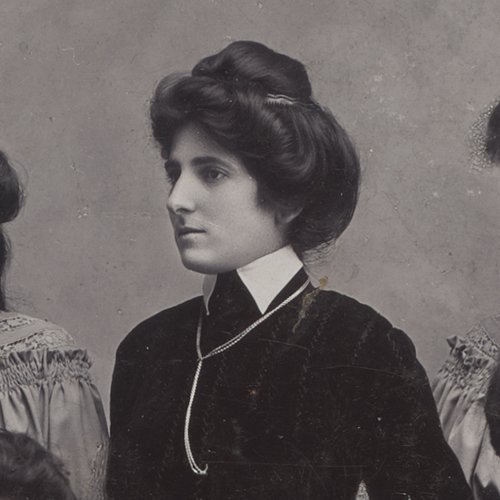Exhibition on Helena Rubinstein to appear for the first time in Poland The Galicia Jewish Museum is pleased to invite you to an exhibition recounting the incredible life of Helena Rubinstein (1872-1965), prepared in cooperation with the Jewish Museum Vienna. 2022 marks Helena Rubinstein’s 150th birthday and the 120th anniversary of the launch of the Rubinstein brand.
Chaya Rubinstein, later known as Helena, was born on 25 December 1872 in Podgórze, near Kraków. The Rubinsteins moved to Kraków soon after her birth, and she grew up in the Jewish quarter of Kazimierz.
Helena stood out from her peers from a young age. The eldest of a brood of siblings of a small-scale merchant, she quickly began caring for her younger sisters and helped her father run his shops. Despite only having a rudimentary education, Helena was able to learn by keenly observing her surroundings. Her unique charisma also made it easy for her to make friends.
The family often moved within Kazimierz. Despite their modest means, it was here that Helena’s mother taught her eight daughters how to take care of their appearances. To her, external grace and inner charm gave girls a chance to find suitable husbands and have a better life. Her lessons had a great impact on her daughters and her preferred cream, which was brought by Helena in a suitcase all the way to Australia, became a recipe for incredible success.
When she left Kraków in search of a better life, Chaya became Helena. It was under this name that she established a cosmetics empire, beginning with a tiny salon in Melbourne. After her initial success, she set out to conquer the Old Country and did so after just a few years. She was also married and the mother of two sons. At the outbreak of the First World War, Helena Rubinstein owned salons in Paris and London. Her tastes were shaped by these two major European capitals, and she befriended many artists. Helena was also interested in fashion and filled her closet with exclusive creations from designers such as Dior, Chanel and Yves Saint Laurent. Her apartments were filled with works by prominent artists such, and Salvador Dali even painted murals for her in her main residence.
During the First World War, Helena set out to conquer the last of the great cosmetics markets. In 1915, she opened her first salon in New York City. Since then, the United States was where she achieved her greatest successes.
When she died in 1965, Helena Rubinstein was considered to be the wealthiest woman of her time and one of the first to become so through her own efforts. Her cosmetics empire had a presence in almost every country in the world and was worth about 100 million USD. She owned factories in the United States, France and Germany. Her magnificent apartments in Paris and New York with their terraces were frequently transformed into catwalks for models for her designer friends. She also owned a huge villa in Provence, France, surrounded by fields of jasmine. However, her incredible wealth did not affect her taste in food – throughout her life she took to work a second breakfast of chicken thighs or hard-boiled eggs in a paper bag. At lavish parties for the upper crust, she served Polish sausage and vodka.
The exhibition at the Galicia Jewish Museum provides a unique opportunity to learn about the life of this incredible Cracovian. Visitors will tap into the spirit of the era through visual materials, including hitherto unknown photographs from Rubinstein’s years in Kraków. Examples of cosmetics from different times are also included in the exhibition.
The most unique aspect of this exhibition is that the creators give voice to Helena Rubinstein herself, through quotes and from the set of a 1929 advertising campaign. The exhibition’s showstopper is an elegant gown designed by Christian Dior and specifically tailored for Helena Rubinstein in the 1950s.
The exhibition will be supplemented by a comprehensive program of accompanying events, including lectures and guided tours to places connected with Helena Rubinstein.
The honorary patron of this exhibition is the Mayor of the City of Kraków, Prof. Jacek Majchrowski.
The exhibition will be presented from 26 October 2022 to 7 May 2023.


